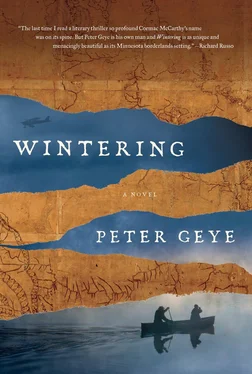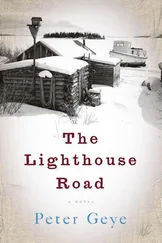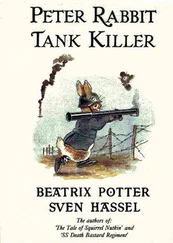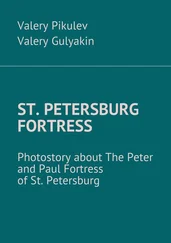And no sooner did he imagine the screaming of the ravens than he heard exactly this — eight or ten or twenty, a whole unkindness, coming over the trees. He watched those living things sharp against the sky, riding gyres up and tucking their wings to veer back down. He might have thought them a warning if he’d had sense to think anything. Instead, he took rope from his pack, laced the heavy antlers to his back, then crossed the lake to the shack.
I’D THOUGHT we had finished clearing out the upper floors of the apothecary. We’d stored the last boxes in the cellar, almost finished replacing windows and repairing warped floorboards, and we were to tear out a wall upstairs to make room for a larger office. The plan to open the historical society by April seemed feasible. Put fresh paint on the walls and a coat of lacquer on the floor, then hang a sign out front, and that’s all that was left to do on the ground floor. It was a winter’s worth of work that I regarded with equal parts satisfaction and doubt and foolishness. Who, after all, would ever visit this old place? No doubt the townsfolk knew enough of their history to want to avoid it. Visitors? They wanted donuts and T-shirts and chance encounters with moose on the trail, not black-and-white photographs and antique housewares and hundred-year-old dresses once worn by the town’s mad hatter.
In any case, I hadn’t been there in a week when I got a call at home. Thursday last, Bonnie on the other end. “There’s something you should see,” she said. So I finished my breakfast and drove in.
Up on the second floor, in Hosea Grimm’s old office, the contractors found a safe behind that wall they were removing. There had been a heavy shelf on casters in front of it before they’d set to work. Bonnie and I stood where splintered two-by-fours framed a black steel door with the words DIEBOLD SAFE & LOCK CO. arced around the tumbler. “Oh my,” I said, my mind wheeling at the possibilities. “What do we do? How can we open it?”
“We’ve sent for a locksmith from Duluth,” Bonnie told me. “I called Buck at the hardware store, but he didn’t think he could do it. Someone should be here before lunchtime.”
And they were. Two brothers spent the better part of an hour cracking the safe while I wondered if there was anything in the world that might surprise me should it fall out. In all the time they worked I couldn’t come up with a single thing. But I was surprised when the safecrackers pulled the handle down and swung the door open: a cigar box full of hundred-dollar banknotes from the First National Bank of Butte, the deed to that old cathouse up in the timber, a Norwegian Bible, a fine hairbrush. But what surprised me was a stack of letters bound with a thin leather cord, which I untied. There were twenty-six in all, fourteen addressed to Thea Inger Eide, c/o Rune Evensen, Gunflint, Minnesota. The others were addressed to Odd and Inger Eide, in Hammerfest, Norway.
“I’ll get you a chair,” Bonnie said, then scurried down the hall. She returned a moment later and set the chair behind me. The brothers from Duluth were packing their bag, and when they finished Bonnie walked them downstairs.
I watched them disappear around the banister and then flipped through the letters one by one, pausing to read the names on each envelope again. Thea Eide. Odd and Inger Eide. Their names were like some sort of strange proof of their existence, as if Harry and later Gus weren’t themselves sufficient. Good Lord, how much had that family endured? Thea came to Gunflint in the autumn of 1895. A sixteen-year-old girl expecting to find her aunt and uncle, she stepped off that boat onto a harsh and bitter shore. Her aunt had hanged herself only weeks before she arrived. Her uncle, Rune Evensen, was crazy before his wife strung a rope from the barn rafters. Perhaps it was a blessing that, instead of meeting him on the Lighthouse Road, she found Hosea Grimm instead. He brought Thea home to Rebekah as though she were a lost kitten.
For a long time Rebekah kept a photograph of Thea on her bureau. Taken by the double-dealing lens of Hosea’s Kodak, the same camera that he used to photograph Rebekah. She spoke of Thea as though she was the only permanent thing she ever knew in life. A quiet and pretty and nervous girl, she had an angelic air, and her kindness was the most obvious thing about her. Rebekah once said that the truest testament to her perfection — the word she used — was that Hosea never once tried to take advantage of it.
Two days after she arrived, Thea went to work cooking at a lumbering camp up on the Burnt Wood River. She did not speak English. She was made to live in an earthen grave, serving a hundred rough men three meals a day. Among all those souls she could not count a single friend. She toiled like a slave’s dog for a hellish winter, and came back to Gunflint in springtime expecting a child. As Rebekah told it, lots of folks thought, with some conviction, that she was the new Mary, mother of Jesus — so inexplicable was it, her emergence from those woods with a bellyful of child. Later that summer, when the Canadian Mounties brought through an itinerant watch salesman on charges of rape and horse thievery, Thea’s virginity was questioned, but never her immaculacy. She went to witness his arraignment with her Norwegian Bible in lieu of a phrasebook, still unable to speak an English sentence.
I used to listen to Rebekah’s stories about Thea and wonder that a woman so strange and beautiful herself could hold another in such exalted esteem. Especially one whose whole life in Gunflint seemed built of suffering. But when I later heard the stories as they’d been given to Harry, I began to believe them. He had a triptych of photographs of Thea Eide on his mantel, much like Rebekah had hers on the bureau. In one of them she’s holding her infant child, Odd Eide, Harry’s father, with a beatific expression on her face that not even the aging, faded paper could diminish. She was dead only a few weeks after the photograph was taken. Died under the care of Hosea Grimm, who had, as Rebekah told me, tried to slice a sadness out of her. A sadness, she was quick to add, that didn’t exist. Thea was the most blissful mother the world had ever known. Rebekah was sure of that. Harry spoke of her as divine, as though she had never really existed any more than the heavens must. How he came by this opinion was not hard to imagine, even if his father knew her only for the first three weeks of his life. Maybe Thea Eide did have some communion with the Savior.
And here were these letters. I don’t know why, but I wondered most not about lost words between Thea and her parents back in Norway, not about the sadness these letters must have delivered, but, rather, about who had stolen them. Hosea was the likeliest culprit, of course. One thing I’d learned for certain in my months of work on the historical society was that his conniving knew almost no limits.
Good Lord, those letters nearly exhaled their sadness. I thought of the countless ones I’d sorted downstairs, when my job was mostly to slot the daily mail. How many words and wishes had passed through my unsuspecting hands? The I-love-yous and we-regret-to-inform-yous and have-you-heards? All of that life. And here were the lives of Thea Eide and her parents. Stolen. Kept. It brought tears to my eyes.
—
My own life in Gunflint began with a letter as well, sent by my father to Rebekah Grimm, one that commended me as a chaste, hardworking girl of sixteen from a God-fearing family of storeowners in Duluth, who was interested in the clerk’s position advertised in the Duluth Tribune and able to leave her studies at Denfeld High School to fill said position at a moment’s notice. He included a picture of me as well as a few words about his store, a grocery on the Traphagen Block that his father had founded. What he didn’t write about was the larger truth that, like many businesses in Duluth in 1936, ours was failing. The shelves were near empty and we had no credit, despite years of keeping our word and our end of the bargain. Our customers suffered the same hard times as we did. Of course, many suffered worse. But our troubles were plenty and true.
Читать дальше












